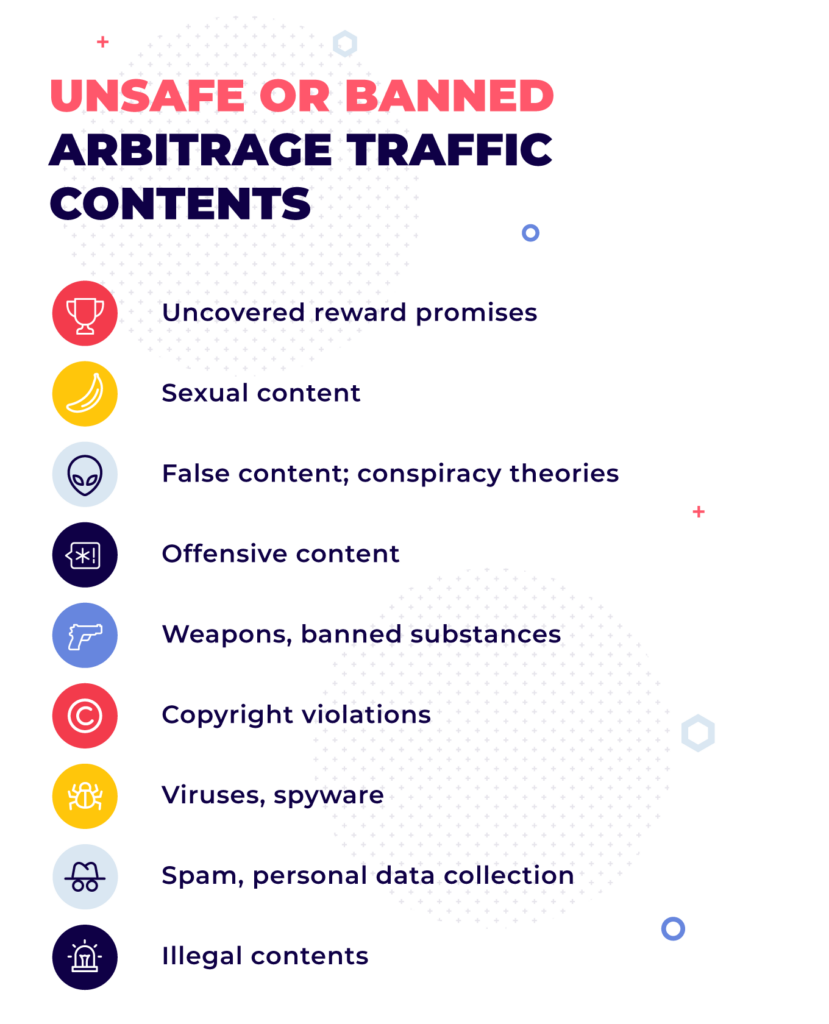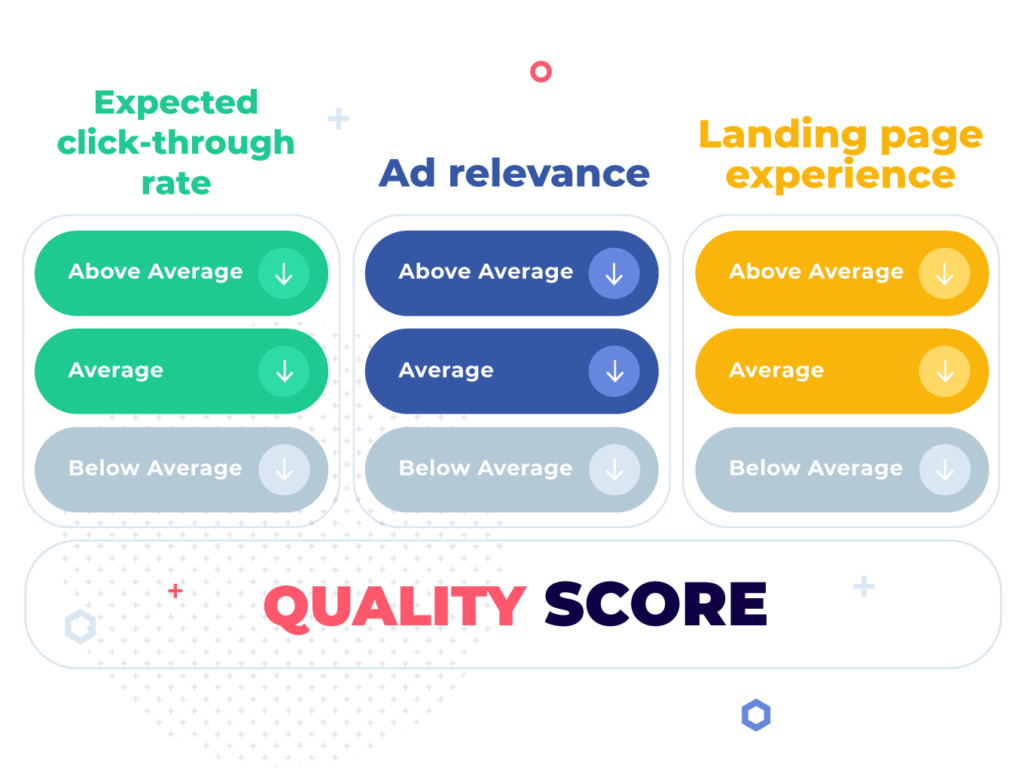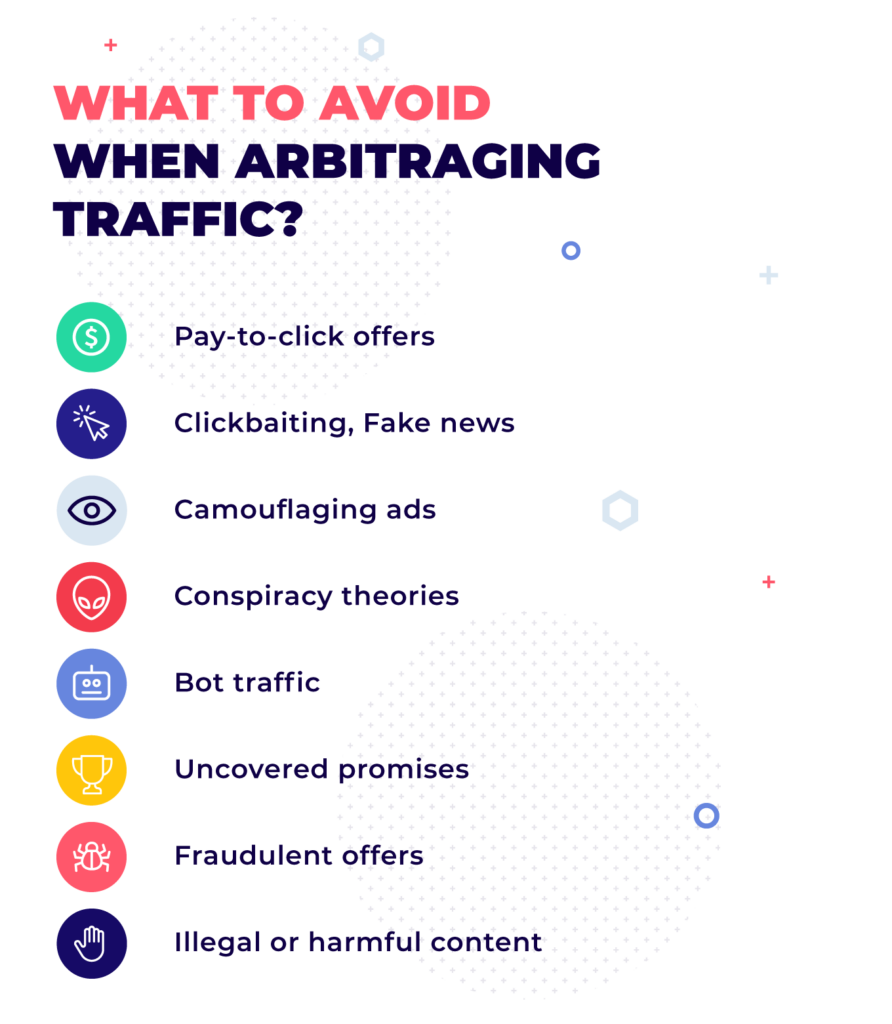We understand how demanding of a task it is to run compliant and clean ad arbitrage. We also totally understand why some arbitrageurs can’t sleep because of feed restrictions. And that is why we’ve created this article.
Inside, you’ll find an explanation on how to make sure your ad arbitrage is better suited to the requirements of feed and traffic providers.
Read on to discover why and how traffic Compliance Teams can become your best friends!
What is ad arbitrage?
The basic scheme is, in theory, really easy to understand. Arbitrageur buys traffic from one source, and via landing pages, natives, banner ads, or search results, redirects it somewhere else. The key to satisfying Return on Investment here is, therefore, the basic rule of trade – buy cheaper and sell expensive. Sounds easy, should work impeccably, but experienced arbitrageurs will most probably agree here – there is more to that. So what are the obstacles for people running arbitrage campaigns?
Challenges for ad arbitrage specialists
Although some would sell traffic arbitrage as the ‘quickest way to make money online’ or ‘free traffic’, this is only the case given that arbitrageurs know how to flawlessly partner with ad networks. And this is, as the reality shows, a demanding task even for seasoned market specialists.
The Traffic Quality demands of ad networks
Top-tier ad networks like Google, Yahoo! or Bing have their own expectations when it comes to the traffic they accept. The above is in fact a big understatement. The most prestigious feed providers will not, and can not, accept shady traffic sources. This is a part of maintaining the credibility of the provider and offering user-safe content sites. Different providers have different sets of rules and filters, so it’s very important to keep track of what are the best arbitrage practices for each of them.
Finding the right traffic for your offer
The offer needs to be targeted to a well-chosen audience, or else the endeavors will prove to be ineffective. And ineffective campaigns will never bring optimal financial results for either of the parties involved. So, as ad optimization is the key factor to making sure that Ad Revenue is satisfactory, we encourage all arbitrageurs to really commit to the testing phase and gather the best intel possible.
But this is us really just stating the obvious. With arbitrage, there is much more to traffic selection than there would be with any other form of marketing because of the TQ (Traffic Quality) or Quality Score requirements that were mentioned above. Low-quality website traffic will most likely be denied by the biggest providers, and no serious arbitrageur can afford that happening regularly, not to mention the risk of losing the feed.
This is where some help becomes handy. Zeropark’s Onboarding and Account Managers are the right people for you to contact for suggestions on GEOs, niches, and optimization tips even before starting the campaign. They are also the people whom you, as an arbitrageur, should provide detailed feedback to.
All arbitrageurs in Zeropark are encouraged to share granular information about their performance with their dedicated campaign management teams. Based on what works best, and on what has been flagged, the Compliance Team alongside the Onboarding and Account Manager Team helps arbitrageurs cut the low yield traffic sources and bring the best out of ad campaigns.
This is one of the many reasons why we recommend having a tracker on, as the more detailed feedback, the more effective support provided by Zeropark.
Filtering out bot traffic
Artificial traffic is something that Google AdSense, Yahoo!, Bing Ads, and other ad networks will definitely flag. Bots are what, unsurprisingly, drastically lowers the TQ score, and what causes major problems with feed providers. Not to mention that this traffic is ineffective and it does not hold any value.
If we look at the numbers, it’s hard not to be astonished. As the researchers found out, even 40% of all Internet traffic in Q1 and Q2 of 2021 came from bots. Hence, it is so crucial to keep your business model bot-free, and it should be a surprise to nobody that ad network providers only want to buy traffic that is reliable.
That is why arbitrageurs need healthy traffic sources that could be trusted. Filtering out bot traffic is one of the focus points of Zeropark specialists, and that is exactly the reason for implementing in-depth, manual approval of all arbitrage campaigns.
We won’t show all our cards, but we can promise that Zeropark has developed efficient and precise tools that block bot traffic from disrupting arbitrageurs’ and advertisers’ campaigns. This provides not only an increased safety for the revenue but also allows you to have your traffic thoroughly tested before being sent further.
Staying compliant
Another priority for every arbitrageur. The ad network’s care for the quality of the traffic touches upon the contents of the offer as well. This means that in order to reach the chosen feed, the offer needs to be of a certain quality as well.
A great example that perfectly showcases how this works is adult traffic. It’s not impossible to run arbitrage on it, but it is incredibly demanding, and not a lot of arbitrageurs are able to have positive ROIs on it and avoid chargebacks.
Below, we’ll dwell a little on what the most prolific ad networks expect ads to be, but for now, we can remind you of Zeropark’s manual approval of EVERY arbitrage campaign. This way, once again, you are making sure that the campaigns you want to send out are double-checked in terms of compliance.
Unsafe or banned arbitrage traffic contents
As we mentioned already a couple of times, arbitrage is a form of advertising that requires careful attention. This applies to the topic of ad contents as well. Universally in arbitrage, there are some topics that are not accepted or will put the arbitrageur at risk. You need to be very careful with promoting sexual content, although the extent of it differs between advertisers.
The same applies to gambling and casino-related offers, which will be treated differently between feed providers and depending on local laws. What will not be accepted, though, are copyright violations, adware, malware, viruses, spam, weapons, or offensive content. The best advice would also be to have your ads touch upon legal and trustworthy offers. More delicate or questionable topics could potentially be flagged by feed providers and Zeropark Compliance Team.

Restrictions from feed providers
The biggest feed providers have their own sets of rules and policies as to what is allowed and what is being instantly flagged. There are also different QS (Quality Score) limits and requirements regarding what could, and can not be displayed within the feed.
In the late 2000s, the giants like Google or Yahoo tried to limit arbitraged traffic, focusing on organic search traffic and ads only, but this proved not to be successful. The compromise is that arbitraged traffic is accepted, and currently even encouraged, but only if certain demands are being fulfilled.
What is a traffic Quality Score?
Every advertisement provided for the ad network’s feed gets assessed and ranked in accordance with an indicator called the Quality Score. It’s a rating between 1-10 which helps grade the relevancy and safety of the provided ad impressions, landing pages, and keywords. The basic thought behind these restrictions is that arbitraged ads need to be as safe as typical organic traffic.
The score is calculated based on three basic components that are being referred to as the average performance of ads published for the given keywords within the previous 90 days. You can see, which components are marked as “Average” or “Below Average“, so that you can make some adjustments:
- expected CTR (Click-Through-Rate) – estimation of how likely it is for users to click your ad;
- relevance of the ad – how exactly it matches the user’s intent;
- the landing page relevancy and utility.
Make sure to start tight cooperation with Zeropark Onboarding or Account Manager to better optimize traffic, scale up the revenues, and display ads accepted by your arbitrage feed provider.

Tips on how to improve the QS in arbitrage
Below, please find our proposals of what could be done to make sure your arbitrage ranks higher and better, as well as gets a better Quality Score grade:
- Optimize keywords by removing underperforming ones;
- Get rid of ads that do not perform;
- Use relevant keywords only – choose quality over quantity;
- Grab the attention of the user;
- Make sure your ad is contextually relevant;
- Filter out bot traffic;
- Use fast, well-optimized, and up-to-date landing pages;
- Use original content only;
- Stay compliant;
- Find good niches and GEOs with the helping hand of the Zeropark Team.
What happens if the traffic is rejected?
If your arbitraged traffic is flagged by feed providers, you will be charged back for the ad placement you bought. If that happens, and we assure you that even the most experienced arbitrageurs are not able to fully avoid that, you must be financially prepared for that. This is why we recommend arbitrage only to those who have significant budgets, and whose liquidity will not be affected by potential disruptions.
In some cases, ad networks can completely block arbitrageurs whose traffic is of poor quality from accessing the feeds. This is a risk taken by those who decide to challenge policies. Cooperation with ZP Account Managers, aided by manual approval, helps arbitrageurs avoid any unwanted bans and chargebacks.
For even more ad arbitrage suggestions and tips, see our article on Running and Scaling Traffic Arbitrage.
Google AdSense arbitrage regulations
Google is, quite rightfully, labeled as the most strict ad network out there both in terms of content and TQ requirements. At one point, the company tried to make the AdSense arbitrage illegal, but unsuccessfully. But to make sure that the 3.4 billion monthly visitors (as of April 2021) are served with the highest of standards, Google needed to really focus on filtering its advertisers and arbitrage traffic providers. This makes Google arbitrage extremely difficult, but also highly rewarding.
Google AdSense Policies
Bear in mind that Google, as well as other ad networks, reserves a right to disable ad serving for these parties that do not comply with their policies or provide low-quality traffic to the feed. In order not to lose access to arbitrage possibilities, please make sure that you are fully in line with Google regulations. In case of any doubts, please consult with your Account or Onboarding Manager, and remember about the obligatory Zeropark Compliance approval process.
Google AdSense program forbids:
- Bot traffic; inflated clicks;
- Uncovered reward promises;
- Camouflaging ads as organic;
- Using paid-to-click, auto-surf, and click exchange traffic;
- Obstructing page navigation for users;
- False claims; irrelevant redirections;
- and more.
See Google’s AdSense Program policies to see in-detail descriptions of what practices are forbidden.
Bing Ads Traffic Quality policies
Bing Network owned by Microsoft is another of the ‘Big three’ search feed providers. Again, every advertiser and arbitrageur needs to comply with the set of rules available in the Traffic Quality Center in order to run safe and profitable campaigns. Microsoft Bing Ads does not accept:
- Low-quality clicks; unusual patterns of activity;
- Unclear commercial intent within the content;
- Robot traffic; Pay-to-click offers;
- Fraudulent traffic;
- and more.
Yahoo Supply Policies
Yahoo!, although is slightly less strict than Google when it comes to filtering out traffic arbitraged to its feed, has clearly outlined Guidelines and Policies, too. It applies to any piece of content provided within Yahoo!, so any arbitrageur should also keep this information close to their heart.
Yahoo! feeds do not accept:
- Bot traffic; automated click tools;
- Pay-to-install; Pay-to-click offers;
- Clickbait; duplicated advertisements;
- False claims; conspiracy theories;
- and more.
Summary
We never promised that staying compliant while proceeding with arbitrage is an easy task. But based on our experience we can assure you that there are healthy practices that will help you avoid trouble, and will facilitate profiting from arbitrage. Let’s sum them up:
- Consult with the Onboarding and Account Managers teams on how to set up and optimize your arbitrage. Provide your feedback as well;
- Get rid of invalid keywords;
- Follow the marketing trends to optimize your landing pages, banners, and native apps;
- Use a tracker;
- Stay contextually-relevant;
- Use Zeropark’s Compliance Team bot-filtering aid;
- Have your content and traffic as clean as possible;
- Be original, and make sure your funnel is conversion-friendly;
- Trust Compliance Team’s manual approval.
Arbitrage may be a demanding business model, but it surely will work for those who want to commit.
Register with Zeropark and see how to boost your ROI with the help of our Compliance Team.
Łukasz Pośpiech






